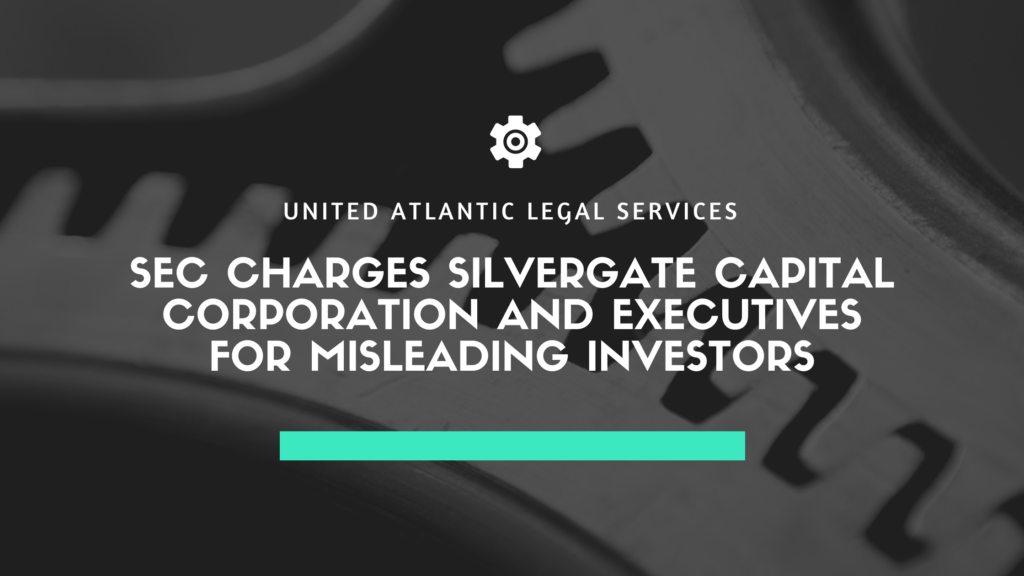
In June 2024, the U.S. Securities and Exchange Commission (SEC) filed a complaint against Silvergate Capital Corporation (SCC) and three of its former executives, Alan J. Lane, Kathleen Fraher, and Antonio Martino. The SEC’s lawsuit focuses on misleading statements and omissions made by Silvergate and its leadership regarding the effectiveness of its Bank Secrecy Act (BSA)/Anti-Money Laundering (AML) compliance program and the company’s financial condition amid the collapse of FTX, a high-profile crypto trading platform.
Key Allegations in the SEC Complaint:
- Misrepresentation of BSA/AML Compliance Program:
- From November 2022 through January 2023, Silvergate misled investors by falsely claiming its BSA/AML compliance program was effective. The company claimed it conducted thorough due diligence and transaction monitoring, specifically related to its crypto asset customers, including FTX.
- In reality, Silvergate’s compliance program was inadequate, with its automated transaction monitoring system failing to detect suspicious activities. For instance, the Silvergate Exchange Network (SEN) handled over $1 trillion in transactions, yet the bank failed to monitor these transactions for potential illicit activities for more than 15 months.
- FTX and Related Entities’ Transactions:
- Silvergate was a banking partner for FTX and its related entities, including Alameda Research. The SEC found that FTX-related entities conducted approximately $9 billion in suspicious transfers, much of which went undetected by Silvergate’s systems.
- Despite the serious deficiencies in its compliance program, Silvergate continued to issue misleading public statements, including to U.S. Senators who had raised concerns about the bank’s role in FTX’s operations.
- Financial Misrepresentation:
- After the FTX collapse triggered a liquidity crisis at Silvergate, the company’s CFO, Antonio Martino, approved an earnings release in January 2023 that misrepresented the amount of securities the bank intended to sell. The bank ultimately had to sell far more securities than reported, leading to understatements of its losses and overstatements of its financial health.
- The misleading disclosures contributed to Silvergate’s collapse, as the bank faced a run on its deposits and severe liquidity issues.
- Fraudulent Conduct by Executives:
- CEO Alan Lane and COO Kathleen Fraher were aware of the compliance deficiencies but continued to mislead investors. Martino, as CFO, further engaged in fraudulent activity by approving false financial disclosures, exacerbating the bank’s dire financial situation.
Legal Violations:
The SEC has charged Silvergate and the three executives with violations of several key securities laws, including Section 10(b) of the Securities Exchange Act and Rule 10b-5, for fraud in connection with the purchase or sale of securities. The agency is seeking civil penalties, disgorgement of ill-gotten gains, and bans on the defendants serving as officers or directors of public companies.
Conclusion:
The SEC’s lawsuit against Silvergate and its executives highlights the critical importance of accurate disclosures, particularly in the high-risk crypto asset industry. The charges serve as a reminder that companies operating in this space must ensure robust compliance programs and transparent financial reporting to protect investors and the broader financial system.
About Michael Rasmussen

Michael Rasmussen is the founder of United Atlantic Legal Services. He is a licensed attorney in Florida and registered solicitor in the United Kingdom. Michael has acted as General Counsel and Chief Compliance Officer to several investment advisers, including private fund managers, responsible for the management of billions of dollars in client assets.
Michael is also the founder of FinProLaw, an online learning platform where Michael has created courses designed for investment adviser compliance professionals. These courses include:
- Investment Adviser Compliance Essential for Chief Compliance Officers
- Foundations of Investment Adviser Compliance
- What is a “Security”?
- Investment Adviser Marketing Rule
- Regulation A – Exemption from Registration
- Regulation Crowdfunding – Exemption from Registration
- Regulation D – Exemption from Registration
Michael can also be found on LinkedIn.
Investment adviser firms who are also clients of United Atlantic Legal Services can receive many of these courses at a significantly reduced fee or, in some cases, at no expense. Contact us today or visit the FinProLaw to learn more.